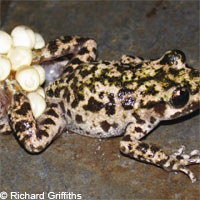Dark clouds loom over European amphibians and reptiles
New EU-funded studies conducted by the International Union for Conservation of Nature (IUCN) show that 23% of amphibians and 21% of reptiles in Europe are threatened with extinction. The research forms part of the IUCN's first European Red Lists for amphibians and reptiles. The European Red Lists review the conservation status of some 6,000 European species including mammals, butterflies and vascular plants. The lists identify species that are threatened with extinction in Europe and help to improve their status by encouraging conservation actions. Threatened species are those that are classified as 'Critically Endangered' (extremely high risk of extinction in the wild), 'Endangered' (very high risk of extinction in the wild) or 'Vulnerable' (high risk of extinction in the wild). The most recent data indicate that the number of amphibians and reptiles in Europe is shrinking. In particular, the decline of amphibians (59%) and reptiles (42%) points to a much higher risk for these species when compared with European mammals and birds. But the burning question is, why? European experts postulate that the key factors wreaking havoc on the lives of amphibians and reptiles are mankind's destruction of the species' natural habitats, climate change, pollution and the presence of invasive species. 'Southern Europe is particularly rich in amphibians but climate change and other threats are placing its freshwater habitats under severe stress,' explained Dr Helen Temple, who co-authored the study. 'Natural habitats across Europe are being squeezed by growing human populations, agricultural intensification, urban sprawl and pollution. That is not good news for either amphibians or reptiles.' Experts note that 85 species of amphibians and 151 species of reptiles make their home in Europe but nowhere else on the globe. A breakdown shows that two amphibian species - Greece's Karpathos Frog (Pelophylax cerigensis) and the Spanish Montseny Brook Newt (Calotriton arnoldi) - have been classified as Critically Endangered. A further 5 species are Endangered, including the Apenine yellow-bellied toad (Bombina pachypus) in Italy, and 10 others are Vulnerable, including the Mallorcan Midwife Toad (Alytes muletensis) pictured above. Overall, 6 reptile species such as the Italian Aeolian Wall Lizard (Podarcis raffonei) have been classified as Critically Endangered, while 11 have been classified as Endangered (e.g. the Cyprus Whip Snake (Hierophis cypriensis)) and 10 as Vulnerable (e.g. Lataste's Viper (Vipera latastei) from south-western Europe). The EU has set 2010 as the year for curbing biodiversity loss. This goal will be met with the implementation of the Biodiversity Action Plan, which specifies priority actions and outlines the responsibilities of Member States and institutions in relation to each action. The plan also comprises a timetable for evaluations and includes indicators for monitoring progress. In April, the EC conference on biodiversity in Athens, Greece issued a message regarding the future biodiversity policy of the EU through the eight-point 'Message from Athens' for nature protection. The message highlighted the need for better communication about the loss and its consequences, and for more funding and raising awareness in the general public, among others. 'On World Biodiversity Day [22 May], this is a sobering discovery,' remarked Commissioner Dimas. 'Despite strong legislation protecting our habitats and most of the species concerned, almost a quarter of Europe's amphibians are now under threat. This reflects the enormous pressure we are placing on Europe's plants and animals, and underlines the need to rethink our relation to the natural world. 'I therefore call on citizens, politicians and industrialists to reflect on our recent "Message from Athens" [found on Commissioner Dimas' blog], and factor a concern for biodiversity into the decisions they make,' he added. 'These trends cannot continue.' The Greek politician has noted how biodiversity, while precious and fragile, contributes significantly to the economic and social well-being of all Europeans. 'This is not widely enough recognised and valued,' he stressed.
Countries
Belgium, Greece

